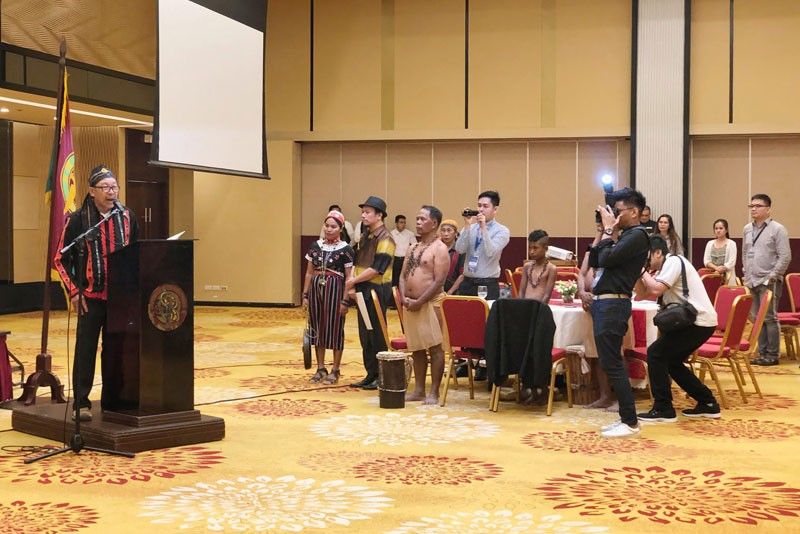Focus on the intangible

This took place last month, but it can’t be too late to congratulate the University of the Philippine Visayas for organizing and hosting the 2nd International Conference on Intangible Cultural Heritage (ICH) in Iloilo City last Oct. 25 and 26. This gathering brought together participants from all over the country and from around the world to focus on an aspect of our cultural, social, and even economic life that we literally don’t see — our intangible heritage, meaning our beliefs, customs, and practices that form a deep spiritual and intellectual resource that we should be tapping into, but have neglected in favor of Facebook and such other attractions of this digital age.
One paper, for example, by Sashah B. Dioso of the Center for West Visayan Studies of UP Visayas, dealt with the role of indigenous beliefs in resource conservation and sustainability in Pandan, Antique. The paper cites how an old man was walking home one day when it suddenly rained. He then “cut two banana leaves to serve as umbrellas for both of them. The latter was heard speaking to the banana that he needed the leaves for them not to get wet and then thanking the plant including ‘kon sin-o man ang rugyan’ or whoever was there (referring to the taglugar). In that situation, the value given to a plant and the respect accorded to the taglugar were evident.
“In general, the indigenous beliefs discussed contribute to the communities’ collective sense of protecting their environment and helping sustain natural resources. The practices mentioned share a common characteristic which is to use natural resources and the environment sustainably. Failure to observe due care in using natural resources may earn the ire of the spirits dwelling in the environment. The taglugar, considered guardians of the environment, are portrayed by these beliefs as active protectors of the environment that constantly watch and give the due punishment to transgressors (while also giving) rewards to people who use natural resources in a manner that is acceptable to the spirits (in terms of) a good catch and bountiful harvest.”
There were dozens of these fascinating reports and presentations on offer at Pagtib-ong (Hiligaynon for “to lift up”), and I was sorry that I couldn’t stay for the two full days, after giving a brief talk at the opening.
I had the privilege of attending the first conference last year and found it extremely informative, provocative, disturbing in some ways at it should be, but also giving reason for hope, in that we clearly have not forgotten the importance of those parts of our cultures and societies — parts far removed from the limelight of entertainment and social media — that define who we are.
Those engaged in ICH know that the life of a cultural scholar and researcher can be a very lonely, thankless, and sometimes even dangerous one. They sometimes wonder if their hard work matters to anyone else, or if it will bring real change to people’s lives. They forego more lucrative pursuits chasing after obscure languages and songs that will never make the Top Ten, or even the Top 1,000. The agencies they apply to for funding ask if their work has any practical economic benefits.
This conference was a welcome and warm reminder that they were not alone, that they all belonged to a community of people who understand, almost intuitively, what many others choose to ignore.
Studies like theirs go into the nerves and the bones — indeed, the DNA — of our culture, of what holds us together as peoples deep beneath the skin. The intangible heritage they are retrieving and preserving is an invaluable resource that we can all draw upon in our respective countries and communities around the ASEAN region.
No one else can do this but universities like UP and UPV, and their counterparts around the region, and scholars and cultural workers who believe fervently in needs other than the physical and the economic, those immediately tangible and measurable bottomline concerns that governments and administrations typically prefer to support.
But there is a cultural bottomline as well that we have barely plumbed, that very few people seem to be interested in, forgetting the fact that many of our national and regional problems are cultural in nature, stemming from our ignorance of who our people truly are and what they truly need and want.
This conference happened at a time when truth and human rights have been devalued all around the world. The delegates met in the face of a creeping train of anti-intellectualism, of suspicion and outright hostility towards teachers, students, and universities who dare to speak to power and to challenge falsehood.
This was all the more reason for ICH workers to persevere in what they do — today, in recovering the threads of our nationhood and weaving them into a coherent narrative that not even the fractiousness of our politics today can tear asunder.
* * *
Email me at jose@dalisay.ph and visit my blog at www.penmanila.ph.



















